专四语法第13节虚拟语气
- 格式:docx
- 大小:84.50 KB
- 文档页数:12
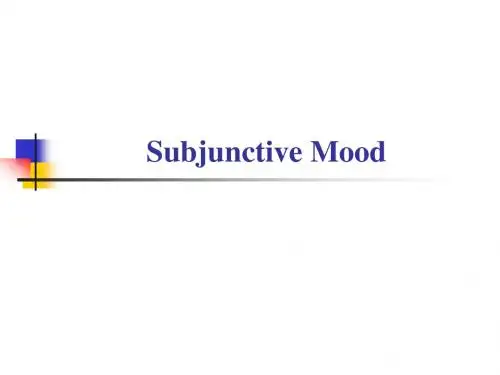
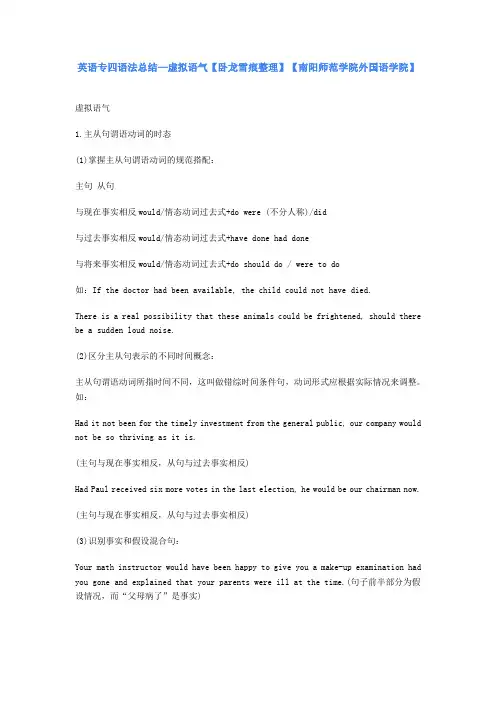
英语专四语法总结—虚拟语气【卧龙雪痕整理】【南阳师范学院外国语学院】虚拟语气1.主从句谓语动词的时态(1)掌握主从句谓语动词的规范搭配:主句从句与现在事实相反would/情态动词过去式+do were (不分人称)/did与过去事实相反would/情态动词过去式+have done had done与将来事实相反would/情态动词过去式+do should do / were to do如:If the doctor had been available, the child could not have died.There is a real possibility that these animals could be frightened, should there be a sudden loud noise.(2)区分主从句表示的不同时间概念:主从句谓语动词所指时间不同,这叫做错综时间条件句,动词形式应根据实际情况来调整。
如:Had it not been for the timely investment from the general public, our company would not be so thriving as it is.(主句与现在事实相反,从句与过去事实相反)Had Paul received six more votes in the last election, he would be our chairman now.(主句与现在事实相反,从句与过去事实相反)(3)识别事实和假设混合句:Your math instructor would have been happy to give you a make-up examination had you gone and explained that your parents were ill at the time.(句子前半部分为假设情况,而“父母病了”是事实)I would have gone to visit him in the hospital had it been at all possible, but I was fully occupied the whole of last week.前半部分为假设,后半部分是事实)2.名词性从句的虚拟形式名词性从句是指宾语从句、主语从句、表语从句和同位语从句。
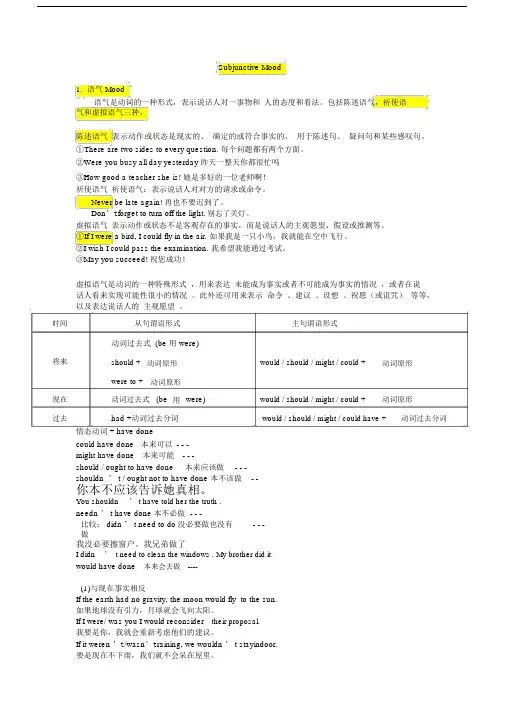
Subjunctive Mood1. 语气 Mood语气是动词的一种形式,表示说话人对一事物和人的态度和看法。
包括陈述语气,祈使语气和虚拟语气三种。
陈述语气表示动作或状态是现实的、确定的或符合事实的,用于陈述句、疑问句和某些感叹句。
①T here are two sides to every question. 每个问题都有两个方面。
②Were you busy all day yesterday 昨天一整天你都很忙吗③How good a teacher she is! 她是多好的一位老师啊!祈使语气祈使语气:表示说话人对对方的请求或命令。
Never be late again! 再也不要迟到了。
Don’t forget to turn off the light.别忘了关灯。
虚拟语气表示动作或状态不是客观存在的事实,而是说话人的主观愿望、假设或推测等。
①I f I were a bird, I could fly in the air. 如果我是一只小鸟,我就能在空中飞行。
②I wish I could pass the examination. 我希望我能通过考试。
③May you succeed! 祝您成功!虚拟语气是动词的一种特殊形式,用来表达未能成为事实或者不可能成为事实的情况,或者在说话人看来实现可能性很小的情况。
此外还可用来表示命令、建议、设想、祝愿(或诅咒)等等,以及表达说话人的主观愿望。
时间从句谓语形式主句谓语形式动词过去式 (be 用 were)将来should +动词原形would / should / might / could +动词原形were to +动词原形现在动词过去式(be用were)would / should / might / could +动词原形过去had +动词过去分词情态动词 + have donecould have done本来可以- - -might have done本来可能- - -should / ought to have done本来应该做- - -shouldn ’ t / ought not to have done 本不该做- -would / should / might / could have +动词过去分词你本不应该告诉她真相。
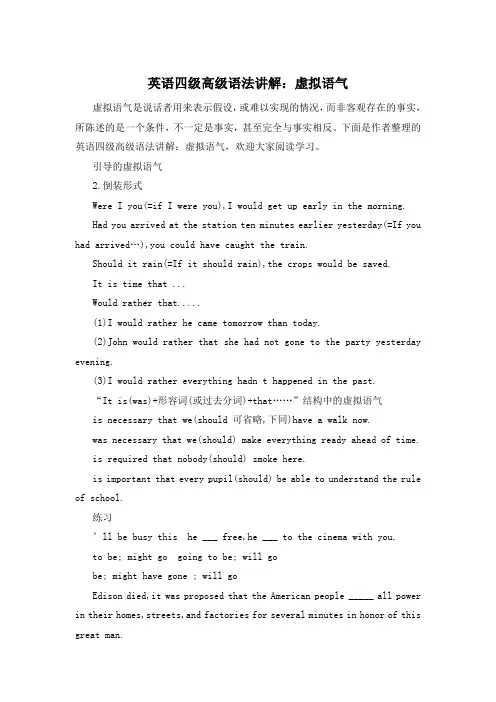
英语四级高级语法讲解:虚拟语气虚拟语气是说话者用来表示假设,或难以实现的情况,而非客观存在的事实,所陈述的是一个条件,不一定是事实,甚至完全与事实相反。
下面是作者整理的英语四级高级语法讲解:虚拟语气,欢迎大家阅读学习。
引导的虚拟语气2.倒装形式Were I you(=if I were you),I would get up early in the morning.Had you arrived at the station ten minutes earlier yesterday(=If you had arrived…),you could have caught the train.Should it rain(=If it should rain),the crops would be saved.It is time that ...Would rather that.....(1)I would rather he came tomorrow than today.(2)John would rather that she had not gone to the party yesterday evening.(3)I would rather everything hadn t happened in the past.“It is(was)+形容词(或过去分词)+that……”结构中的虚拟语气is necessary that we(should 可省略,下同)have a walk now.was necessary that we(should) make everything ready ahead of time.is required that nobody(should) smoke here.is important that every pupil(should) be able to understand the rule of school.练习’ll be busy this he ___ free,he ___ to the cinema with you.to be; might go going to be; will gobe; might have gone ; will goEdison died,it was proposed that the American people _____ all power in their homes,streets,and factories for several minutes in honor of this great man.off offturn off turned offI known her name,_____.does she know mine? where does she live?would have invited her to lunch would be beautiful’d rather you ______ by train,because I cant bear the idea of your being in an airplane in such bad weather.go gogonevictim ________(本来会有机会活下来) if he had been taken to hospital in time.would have a chance to survive(翻译)professor required that ________(我们交研究报告)。

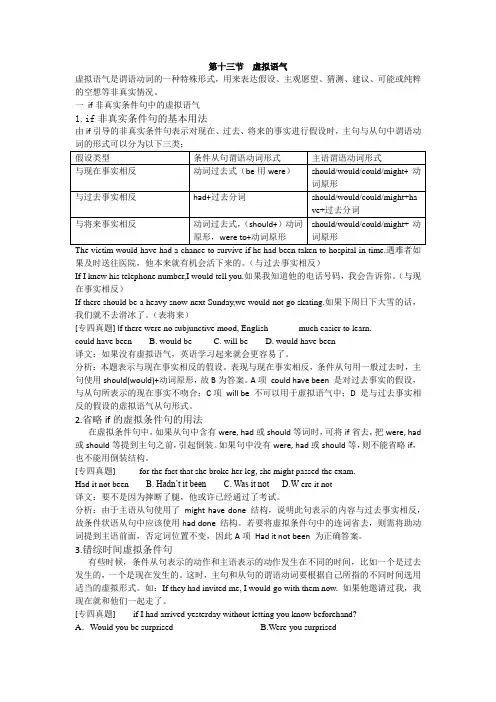
第十三节虚拟语气虚拟语气是谓语动词的一种特殊形式,用来表达假设、主观愿望、猜测、建议、可能或纯粹的空想等非真实情况。
一if非真实条件句中的虚拟语气1.if非真实条件句的基本用法由if引导的非真实条件句表示对现在、过去、将来的事实进行假设时,主句与从句中谓语动The victim would have had a chance to survive if he had been taken to hospital in time.遇难者如果及时送往医院,他本来就有机会活下来的。
(与过去事实相反)If I knew his telephone number,I would tell you.如果我知道他的电话号码,我会告诉你。
(与现在事实相反)If there should be a heavy snow next Sunday,we would not go skating.如果下周日下大雪的话,我们就不去滑冰了。
(表将来)[专四真题] I f there were no subjunctive mood, English ______ much easier to learn.could have been B. would be C. will be D. would have been译文:如果没有虚拟语气,英语学习起来就会更容易了。
分析:本题表示与现在事实相反的假设。
表现与现在事实相反,条件从句用一般过去时,主句使用should(would)+动词原形,故B为答案。
A项could have been 是对过去事实的假设,与从句所表示的现在事实不吻合;C项will be 不可以用于虚拟语气中;D 是与过去事实相反的假设的虚拟语气从句形式。
2.省略if的虚拟条件句的用法在虚拟条件句中,如果从句中含有were, had或should等词时,可将if省去,把were, had 或should等提到主句之前,引起倒装。
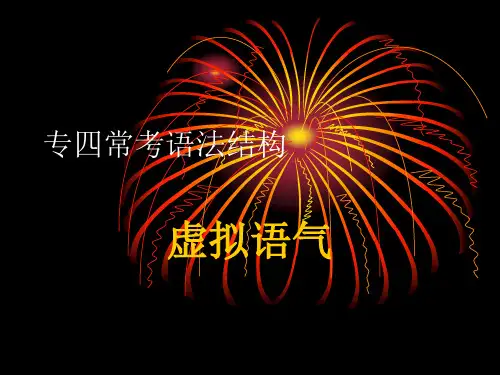
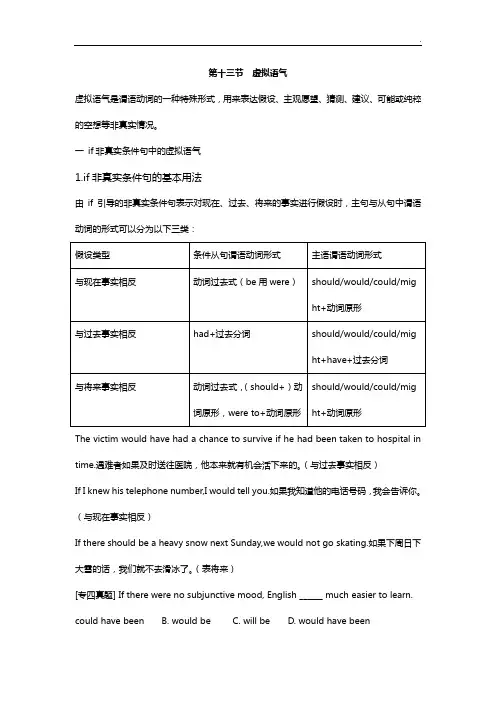
第十三节虚拟语气虚拟语气是谓语动词的一种特殊形式,用来表达假设、主观愿望、猜测、建议、可能或纯粹的空想等非真实情况。
一if非真实条件句中的虚拟语气1.if非真实条件句的基本用法由if引导的非真实条件句表示对现在、过去、将来的事实进行假设时,主句与从句中谓语动词的形式可以分为以下三类:The victim would have had a chance to survive if he had been taken to hospital in time.遇难者如果及时送往医院,他本来就有机会活下来的。
(与过去事实相反)If I knew his telephone number,I would tell you.如果我知道他的电话号码,我会告诉你。
(与现在事实相反)If there should be a heavy snow next Sunday,we would not go skating.如果下周日下大雪的话,我们就不去滑冰了。
(表将来)[专四真题] If there were no subjunctive mood, English ______ much easier to learn. could have been B. would be C. will be D. would have been译文:如果没有虚拟语气,英语学习起来就会更容易了。
分析:本题表示与现在事实相反的假设。
表现与现在事实相反,条件从句用一般过去时,主句使用should(would)+动词原形,故B为答案。
A项could have been 是对过去事实的假设,与从句所表示的现在事实不吻合;C项will be 不可以用于虚拟语气中;D 是与过去事实相反的假设的虚拟语气从句形式。
2.省略if的虚拟条件句的用法在虚拟条件句中,如果从句中含有were, had或should等词时,可将if省去,把were, had或should等提到主句之前,引起倒装。
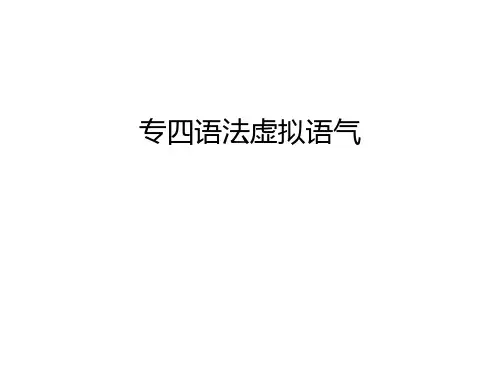
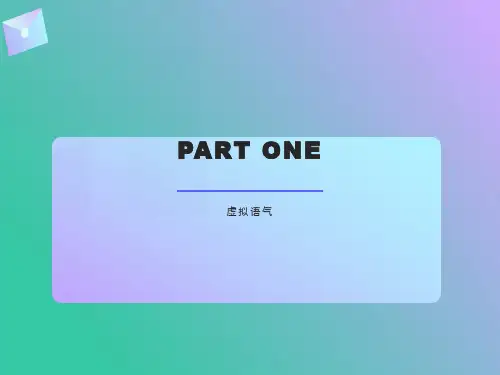
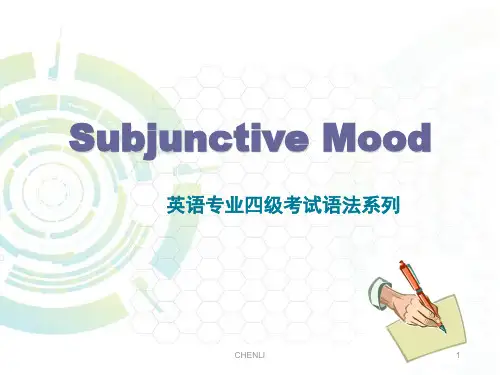
二,虚拟语气Ⅰ.条件状语从句中的虚拟语气①.基本形式 if 从句主句与现在相反过去时(were) would/could/should/might+ do与过去相反过去完成时would/could/should/might+havedone与将来相反 were to would/could/should/might+ doshould/could▲should也可以引导一个条件句,但所假设的事一般不会发生,且后面的主句(一般为祈使句)不能倒装。
②.倒装:如果条件句中的谓语动词含有were,should,had时,可以省略if,把三个词放在主语之前构成倒装,如果句子是否定句,not不跟着提前。
Eg. If he had come a little earlier, I might have met him.Had he come a little earlier, I might have met him.If he were to leave tomorrow, I would go with go with him.Were he to leave tomorrow, I would go with him.③.错综时间的虚拟条件状语Eg. If I had studied hard, I would be in a very comfortable office now.If you were older, I would have let you go yesterday.④.含蓄的虚拟条件状语从句:无if从句的出现,用其他形式表示出虚拟的意义,常见的词和词组:without, in the absence of,Otherwise, but for, butEg. Without your help, I couldn't have done it well.If you had not helped me, I couldn't have done it well.In the absence of water, plants couldn't grow well.If there were no water, plants couldn't grow well.He was held up in the traffic, otherwise, he wouldn't have been late If he hadn't been held up in the traffic, he couldn't have been late.But for the rain, our trip would have been pleasant.But for the rain, we would have a pleasant trip.If it hadn't rain, we would have a pleasant trip.I could have written the paper before, but I was still.II.其他状语从句中的定语从句ⅰ.让步状语从句在whethe r…or,though,no matter等引导的状语从句中,谓语经常用should/may+v.原,在这个句型中,可以将whether省略(or不可省),though,no matter省略,再省略should和may,而把动词be放在主语前面,构成倒装Eg. Everything around us, whether it may be/should be air, orwater, or stone, is matter.Everything around us, be it air or water, or stone, ismatter.Though he should/may be too weak to walk too much, I willadvise him to walk a little every day.Be he too weak to walk too much, I will advise him to walka little every day.ⅱ.在lest,in case,for fear that…引导的原因状语从句中,从句经常用should+v.原表示虚拟,其中in case可用陈述语气。
英语专业四级虚拟语气语法考点英语专业四级虚拟语气语法考点专四语法考点虚拟语气、情态动词、非谓语动词、复合句、倒装、小语法(省略,时态,反义疑问句,代词,强调句,主谓一致,冠词,形容词及副词)、as的特殊用法。
以下是店铺为大家搜索整理的英语专业四级虚拟语气语法考点,希望能给大家带来帮助!英语专四语法考点串讲之一虚拟语气一般说来,有下列几种考点需要考生注意(十考点及两备考点)考点1. 与现在事实相反从句谓语动词用did(be用were),主句谓语动词would(should,could,might)+do;考点2. 与过去事实相反从句谓语动词用had done,主句谓语动词用 would(should,could,might)+ have done;例如:43.I _________the party much more if there hadn’t been quite such a crowd of people there.A. would enjoyB. will have enjoyedC. would have enjoyedD. will be enjoying49.All of us would have enjoyed the party much more if there _________ quite such a crowd of people there.A. weren’tB. hasn’t beenC. hadn’t beenD. wouldn’t考点3.与将来事实相反,从句谓语动词用:did(should+do或were + to do),主句谓语动词用:would(should,could,might)+do。
例如:43. If your car ___ any attention during the first 12 months, take it to an authorized dealer.(08年)• A. shall need C. would need• B. should need D. will need考点4. 时态的交叉现象,也就是主句与从句的动作发生在不同的时间段例如:If you had gone to see the doctor,you would be all right now.你要是早去看病,你现在就没事了。
一、虚拟语气用法讲解英语有三种语气,即陈述语气、祈使语气和虚拟语气二、带虚拟条件的虚拟语气1. 真实条件句和非真实条件句条件句有真实条件句和非真实(虚拟)条件句两种。
真实条件句所表示的假设是有可能发生的,而非真实条件句则通常表示一种假想,与事实相反或不大可能会发生:If I have time, I will go with them. 假若我有时间,我就同他们去。
(陈述语气) If I were you, I would go with them. 假若我是你,我就同他们去。
(虚拟语气) 2. 虚拟条件句的三种基本类型(1) 若与现在事实相反,条件从句的谓语用过去式(be通常用were),主句谓语用“should (would, could, might)+动词原形”:If you took a taxi,you’d get there quicker. 如果你坐出租车去,你可以快一点到那里。
(但你没有坐出租车)If I knew her number I could ring her up. 要是我知道她的电话号码,我就可以给她打电话了。
(可惜我不知道)(2) 若与过去事实相反,条件从句的谓语用过去完成时(had+过去分词),主句谓语用“should (would, could, might)+have+过去分词”:If I had left sooner,I would have been on time. 要是我早点动身,我就准时到了。
(但我动身太迟了) 【I had left缩写I’d left;I would have been缩写为I’d have been】If we had found him earlier we could have saved his life. 要是我们当时早点找到他的话,我们就可以救活他。
(可惜我们找到他太晚了)(3) 若与将来事实相反:条件从句a)If+主语+动词过去式;b)If+主语+were to+动词原形;c)If+主语+should+动词原形(注意不能是would)。